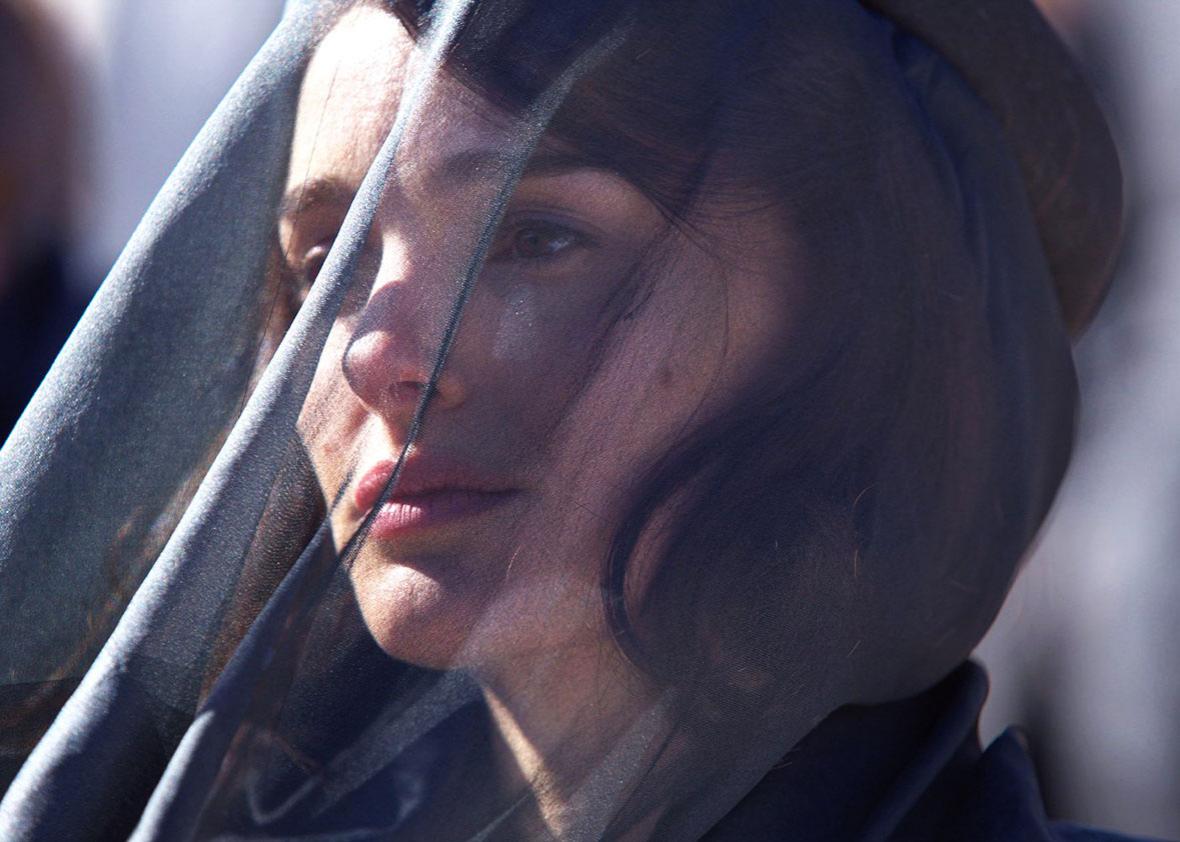Jackie Kennedy in her pink Chanel suit and matching pillbox hat, standing expressionless at Lyndon Johnson’s side during his swearing-in aboard Air Force One. Jackie Kennedy in a black lace widow’s veil, following her husband’s horse-drawn casket in a somber and pageantry-filled procession through the streets of the capital. Jackie Kennedy in a prim wool dress and heels, leading a CBS reporter on a tour of the newly redecorated White House as she describes the carved piano legs in an elegantly remote finishing-school voice. These images are burned into the American psyche; any attempt to recreate them in fictionalized form runs a high risk of turning into either slavish re-enactment or rosy hagiography.
The ambitious Chilean director Pablo Larraín (No, Neruda) nimbly avoids both those traps. His first American film, Jackie never feels like a ploddingly banal biopic, nor does it demonstrate the slightest interest in inspiration or uplift. Yet it’s not always clear what Larraín is setting out to do in this handsomely mounted character portrait, other than showcase an elaborately mannered performance by Natalie Portman as the grief-numbed former first lady.
Through two viewings of Jackie, I was never able to pin down whether it was Portman’s performance or Larraín’s way of framing it that left me emotionally shut out. The experiences we see Jackie undergo—informing her two small children of their father’s death, organizing her husband’s televised public funeral, consulting with a Catholic priest (John Hurt) about the seeming indifference or cruelty of God—are wrenching, but I didn’t feel the least bit wrenched. For all its disorienting intensity, emphasized by Mica Levi’s keening and discordant score, Jackie operates at a chilly remove from the viewer.
Scripted by Noah Oppenheim, a former TV news producer and current executive at the Today show, Jackie is a movie with a historical thesis to argue: that the first first lady to take advantage of the television age was a master manipulator of image, a practitioner par excellence of the art of political theater. When she’s gently urged by Lady Bird Johnson to change her bloodstained suit before emerging from Air Force One, Jackie refuses, insisting that “I want them to see what they’ve done.” Given the choice of a modest funeral service or a pomp-filled public spectacle, she goes with a grand procession modeled after the funeral of Abraham Lincoln. And speaking with a reporter (Billy Crudup) at the Kennedy mansion in Hyannisport, Massachusetts, a week after the assassination, she’s careful to insist on control over the final edit of their interview.
JFK himself is glimpsed only obliquely in flashbacks. His brother and Attorney General Bobby Kennedy (Peter Sarsgaard) is a slightly more salient figure, though he too remains for the most part a foil for Portman’s Jackie, who’s often shown in extreme close-up, her delicate features engaged in all manner of emotion-concealing gymnastics. Those who loved Portman’s Oscar-winning performance as a schizoid ballerina in Black Swan will be blown away by her virtuosic turn as the brittle but steel-willed Jackie. For me, both performances registered as studied and self-conscious. Although Portman nails the former first lady’s breathless, kittenish voice and many of her gestural mannerisms, the performance often feels overblown; when her Jackie dissembles (as she does in nearly every public utterance she makes), Portman’s face telegraphs not only her outer and inner emotional states but the act of dissembling itself. She signposts the repression of feeling, where the real-life Jackie Kennedy displayed a curious stillness and sphinxlike reserve.
Even if Jackie lacks the formal invention of Larraín’s Chilean work (especially the stunning Neruda, which also opens this December), there’s much pleasure to be derived from a film that, like the famously soignée first lady herself, has every detail of taste and style firmly in place. Stéphane Fontaine’s cinematography shifts effortlessly from the creamy pastels of early-’60s design (teal-blue cars, absinthe-green gowns) to a flawless reproduction of the blurry black-and-white television of the period. Jean Rabasse’s meticulous production design and Madeline Fontaine’s splendid costumes contribute to the eerie sense of being transported back to the stiffer, more formal world of half a century ago (even if the slouchy Greta Gerwig, as Jackie’s closest aide Nancy Tuckerman, sometimes breaks the spell).
In some ways, Jackie is a movie about the power of design—in her time as first lady, Mrs. Kennedy was best known as a fashion icon and a restorer and redecorator of the White House. Near the end of the film, the newly widowed Jackie stares dully out a car window at a row of fashionable shops stocked with mannequins aping her style. In an earlier scene, she happens upon Lyndon and Lady Bird Johnson examining a new pair of drapes for the White House that’s now theirs. Viewed at a moment when a new president and first lady are about to start sampling their own (no doubt far glitzier) fabric swatches, this scene serves as a reminder that the public’s perception of the most powerful address in the land is defined not only by what the occupants of 1600 Pennsylvania Ave. do but also—in large part because of Jackie Kennedy’s legacy—by how they look doing it. As a former reality-TV star and an ex-model, Donald and Melania Trump seem likely to become perhaps the most image-dependent first couple in American history—a fact that lends Jackie a pang of nostalgia the director couldn’t have intended, as the viewer walks out wondering how we got from there to here.
